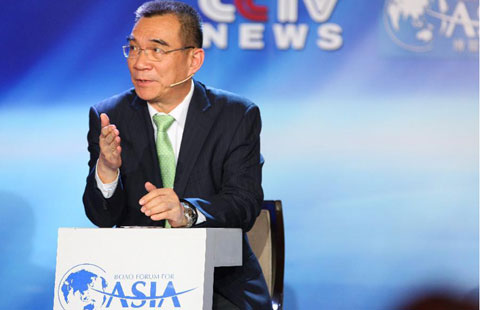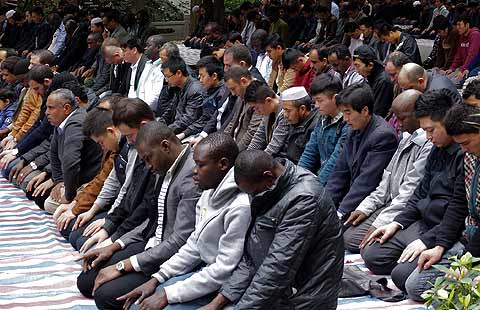Fine-tuning crucial for growth
Updated: 2014-04-10 07:11
By Gao Changxin in Shanghai (China Daily USA)
|
|||||||||
The nation's top economic planning agency said on Wednesday that domestic economic growth will be under pressure over the next two years and macroeconomic policies must be fine-tuned to ensure long-term expansion.
In an 80-page midterm evaluation of the implementation of the 12th Five-Year Plan (2011-15), the National Development and Reform Commission said that controlling risks in local government debt is an important factor in maintaining growth for the remainder of the plan period and beyond.
"Effectively controlling overall debt risk while making sure reasonable financing needs are met has an important role in stabilizing growth," the NDRC said in the evaluation.
Macroeconomic policies need "tweaking" to achieve a combination that targets both demand and supply, with a focus on supply efficiency.
Current measures, which consist mainly of expansionary fiscal and monetary policies, are achieving diminishing results in stimulating growth, it added.
Inappropriate policies will worsen overcapacity, delay structural adjustments and exacerbate debt risks.
"The focus of growth creation should be turned to improving the market-based economic system and business environment," said the NDRC.
The People's Bank of China's hands are tied now as growth cools despite rapid credit expansion, a sign that the economy has grown less responsive to monetary stimulus. As China attempts to deleverage the economy from the debts generated from the 2008-09 stimulus package of 4 trillion yuan ($645 billion), the PBOC is running out of ammunition to generate growth when needed.
Beijing is relying on fiscal measures, mainly government-led investment, to keep growth at a level that creates sufficient jobs.
The economy got off to a tough start this year, with many economists estimating that first-quarter GDP growth may have slowed to the lowest level since 2009.
But Fitch Ratings Inc said in a report on April 4 that using investment to stimulate growth is not sustainable.
"China's growth model faces tightening constraints from the rapidly increasing burden of leverage in the economy and from the deteriorating ability of the economy to absorb additional investment profitably," said Fitch. "Continued growth of investment faster than overall GDP could see further erosion of China's current account surplus as the capacity of domestic savings to finance investment becomes more constrained."
Barclays Plc has joined many other financial institutional in estimating 7.3 percent first-quarter growth, down from 7.7 percent from the fourth quarter last year. The bank said on Wednesday that it believes the PBOC has already loosened credit controls. It estimated that new loans totaled 1.1 trillion yuan in March, compared with 644.5 billion yuan in February.
The World Bank said on Monday that Chinese economic growth will ease to 7.6 percent this year from 7.7 percent in 2013.
Tax cuts for small firms
Beijing unveiled new tax cuts for small businesses on Wednesday, amid widespread expectations that first-quarter economic growth was the weakest since 2009.
The Ministry of Finance said enterprises with annual taxable income of less than 100,000 yuan ($16,000) will enjoy a corporate income tax rate of 20 percent, instead of the regular 25 percent. Their revenue will also be cut in half when calculating taxable income. The cut is effective until Dec 31, 2016
Up to 75 percent of businesses in China are small and micro. They contribute around half of the country's total taxation.
Tax rebates targeting small businesses first started in 2010, when the taxable income threshold was set at 30,000 yuan. It was raised to 60,000 yuan in 2011.
It's estimated that more than 6 million small businesses will benefit from the latest tax cut.
The reduction is one of a series of pro-growth measures promised by Premier Li Keqiang last week.
Li also promised to speed up the renovation of shantytowns. The country will for the first time set up a unit under the China Development Bank that specifically focuses on accounting and financing government-backed housing projects. Financial institutions, including lenders, pension funds and insurers, will be encouraged to buy bonds issued by the unit.
Beijing will also speed up railway investment, partly through the setting up of a national rail development fund that allows the participation of private capital.
gaochangxin@chinadaily.com.cn
(China Daily USA 04/10/2014 page13)

 Top 10 China archeological discoveries for 2013
Top 10 China archeological discoveries for 2013
 Mummy & me in New Zealand
Mummy & me in New Zealand
 Chinese schools vie in moot court
Chinese schools vie in moot court
 Australian divers start underwater search for MH370
Australian divers start underwater search for MH370
 Cleaver-wielding man subdued after tense standoff
Cleaver-wielding man subdued after tense standoff
 Pro-Russian demonstrators announce Kharkov's independence
Pro-Russian demonstrators announce Kharkov's independence
 Breakdancer 'freezes' in front of Paris landmarks
Breakdancer 'freezes' in front of Paris landmarks
 TV Debate in Boao Forum for Asia Annual Conference
TV Debate in Boao Forum for Asia Annual Conference
Most Viewed
Editor's Picks

|

|

|

|

|

|
Today's Top News
Ships sale to Taiwan 'unlikely'
Hagel gets closer to PLA
21 injured in Pennsylvania school
World leaders join Weibo
Beijing could lead clean-energy debate
China's mixed stories in quest for resources
Crimes of Hirohito on stage: 'We can't let it happen again'
Cross-border deals headed south?
US Weekly

|

|








